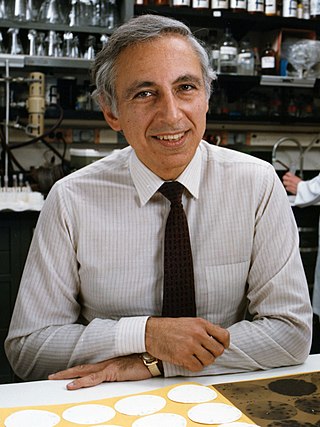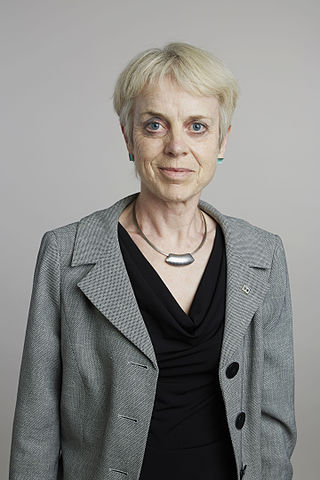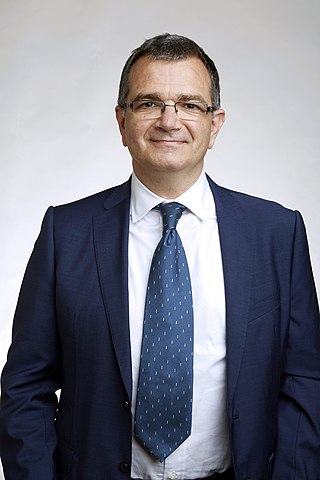Related Research Articles
Sir Michael Anthony Epstein is a British pathologist and academic. He is one of the discoverers of the Epstein–Barr virus, along with Yvonne Barr and Bert Achong.
Following infection with HIV-1, the rate of clinical disease progression varies between individuals. Factors such as host susceptibility, genetics and immune function, health care and co-infections as well as viral genetic variability may affect the rate of progression to the point of needing to take medication in order not to develop AIDS.

Robert Charles Gallo is an American biomedical researcher. He is best known for his role in establishing the human immunodeficiency virus (HIV) as the infectious agent responsible for acquired immune deficiency syndrome (AIDS) and in the development of the HIV blood test, and he has been a major contributor to subsequent HIV research.
Christopher Edward Rudd, is a Canadian-born immunologist-biochemist. He is currently Professor of Medicine at the Universite de Montreal and Director, Immunology-Oncology at the Centre de Recherche Hôpital Maisonneuve-Rosemont (CR-HMR).
Veronica van Heyningen is an English geneticist who specialises in the etiology of anophthalmia as an honorary professor at University College London (UCL). She previously served as head of medical genetics at the MRC Human Genetics Unit in Edinburgh and the president of The Genetics Society. In 2014 she became president of the Galton Institute. As of 2019 she chairs the diversity committee of the Royal Society, previously chaired by Uta Frith.

Tomas Robert Lindahl FRS FMedSci is a Swedish-British scientist specialising in cancer research. In 2015, he was awarded the Nobel Prize in Chemistry jointly with American chemist Paul L. Modrich and Turkish chemist Aziz Sancar for mechanistic studies of DNA repair.

The primate T-lymphotropic viruses (PTLVs) are a group of retroviruses that infects primates, using their lymphocytes to reproduce. The ones that infect humans are known as human T-lymphotropic virus (HTLV), and the ones that infect Old World monkeys are called simian T-lymphotropic viruses (STLVs). PTLVs are named for their ability to cause adult T-cell leukemia/lymphoma, but in the case of HTLV-1 it can also cause a demyelinating disease called tropical spastic paraparesis. On the other hand, newer PTLVs are simply placed into the group by similarity and their connection to human disease remains unclear.
Martin Bobrow is a British geneticist, and Emeritus Fellow, Wolfson College, Cambridge.

Dame Amanda Gay Fisher is a British cell biologist and Director of the Medical Research Council (MRC) London Institute of Medical Sciences at the Hammersmith Hospital campus of Imperial College London, where she is also a Professor leading the Institute of Clinical Sciences. She has made contributions to multiple areas of cell biology, including determining the function of several genes in HIV and describing the importance of a gene's location within the cell nucleus.
Viral synapse is a molecularly organized cellular junction that is similar in some aspects to immunological synapses. Many viruses including herpes simplex virus (HSV), human immunodeficiency virus (HIV) and human T-lymphotropic virus (HTLV) have been shown to instigate the formation of these junctions between the infected ("donor") and uninfected ("target") cell to allow cell-to-cell transmission. As viral synapses allow the virus to spread directly from cell to cell, they also provide a means by which the virus can escape neutralising antibody.

Annette Catherine Dolphin is a Professor of Pharmacology in the Department of Neuroscience, Physiology and Pharmacology at University College London (UCL).

Christl Ann Donnelly is a professor of statistical epidemiology at Imperial College London, the University of Oxford and a Fellow of St Peter's College, Oxford. She serves as associate director of the MRC Centre for Global Infectious Disease Analysis.

Antony Giuseppe Galione is professor of Pharmacology and Wellcome Trust Senior Investigator in the Department of Pharmacology at the University of Oxford.

Dimitri Michael Kullmann is a professor of neurology at the UCL Institute of Neurology, University College London (UCL), and leads the synaptopathies initiative funded by the Wellcome Trust. Kullmann is a member of the Queen Square Institute of Neurology Department of Clinical and Experimental Epilepsy and a consultant neurologist at the National Hospital for Neurology and Neurosurgery.

(Edith) Yvonne Jones is director of the Cancer Research UK Receptor Structure Research Group at the University of Oxford and a Fellow of Jesus College, Oxford. She is widely known for her research on the molecular biology of cell surface receptors and signalling complexes.

Andrew Neil James McKenzie is a molecular biologist and group leader in the Medical Research Council (MRC) Laboratory of Molecular Biology (LMB).

Sir Andrew James McMichael, is an immunologist, Professor of Molecular Medicine, and previously Director of the Weatherall Institute of Molecular Medicine at the University of Oxford. He is particularly known for his work on T cell responses to viral infections such as influenza and HIV.

Vincenzo Cerundolo was the Director of the Medical Research Council (MRC) Human Immunology Unit at the University of Oxford, at the John Radcliffe Hospital and a Professor of Immunology at the University of Oxford. He was also a Supernumerary Fellow at Merton College, Oxford. He was known for his discoveries in processing and presentation of cancer and viral peptides to T cells and lipids to invariant NKT cells. Cerundolo died of lung cancer on 7 January 2020.
Gurdyal Singh Besra is Bardrick Professor of Microbial Physiology & Chemistry at the University of Birmingham.
Caetano Maria Pacheco Pais dos Reis e Sousa is a senior group leader at the Francis Crick Institute and a professor of Immunology at Imperial College London.
References
- ↑ Charles Bangham publications from Europe PubMed Central
- 1 2 3 4 Anon (2019). "Professor Charles Bangham FMedSci FRS". royalsociety.org. London: Royal Society. Archived from the original on 2019-04-24. One or more of the preceding sentences incorporates text from the royalsociety.org website where:
“All text published under the heading 'Biography' on Fellow profile pages is available under Creative Commons Attribution 4.0 International License.” --Royal Society Terms, conditions and policies at the Wayback Machine (archived 2016-11-11)
- ↑ Charles Bangham publications indexed by the Scopus bibliographic database. (subscription required)
- ↑ Bangham, Charles R. M. (1987). The cellular immune response to respiratory syncytial virus in mouse and man. jisc.ac.uk (PhD thesis). National Institute for Medical Research. OCLC 59722675. EThOS uk.bl.ethos.376958.
- ↑ "HTLV-1 The Forgotten Cousin of HIV - Professor Charles Bangham, Imperial College London • scipod.global". January 11, 2019.
- ↑ Phillips, Rodney E.; Rowland-Jones, Sarah; Nixon, Douglas F.; Gotch, Frances M.; Edwards, Jon P.; Ogunlesi, Afolabi O.; Elvin, John G.; Rothbard, Jonathan A.; Bangham, Charles R. M.; Rizza, Charles R.; McMichael, Andrew J. (1991). "Human immunodeficiency virus genetic variation that can escape cytotoxic T cell recognition". Nature. 354 (6353): 453–459. Bibcode:1991Natur.354..453P. doi: 10.1038/354453a0 . ISSN 0028-0836. PMID 1721107. S2CID 4257933.

- ↑ Price, D. A.; Goulder, P. J. R.; Klenerman, P.; Sewell, A. K.; Easterbrook, P. J.; Troop, M.; Bangham, C. R. M.; Phillips, R. E. (1997). "Positive selection of HIV-1 cytotoxic T lymphocyte escape variants during primary infection". Proceedings of the National Academy of Sciences. 94 (5): 1890–1895. Bibcode:1997PNAS...94.1890P. doi: 10.1073/pnas.94.5.1890 . ISSN 0027-8424. PMC 20013 . PMID 9050875.